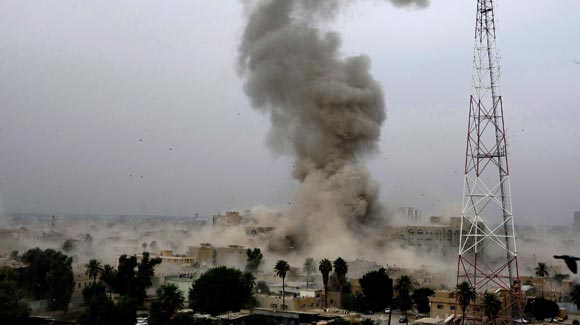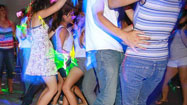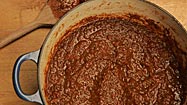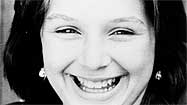
Smoke billows from an explosion near the Justice Ministry in central Baghdad. (Sabah Arar / AFP/Getty Images / October 25, 2009) |
Reporting from Baghdad -
Car
bombs exploded in Baghdad this morning next to two key government
buildings, killing at least 147 people and wounding more than 700. The
explosions occurred as political leaders were preparing to meet to try
to resolve a fierce dispute that could delay national elections, ranked
as pivotal to Iraq's long-term stability.
The car bombs, at least one of them a suicide bombing, according to police, blew up by the justice ministry and a Baghdad provincial office, sites separated by one broad city block. The attacks, the bloodiest in Iraq this year, hit the nerve center of Baghdad's national and local governments, shattering windows, sending debris flying and tearing down parts of buildings.
Salam Ali, 30, had been riding his motorcycle to work when the blast knocked him off his bike. "I saw people wounded and killed at the explosion scene," said Ali, speaking from the crowded Karkh hospital in western Baghdad. "Security forces started to shoot randomly. There was flames and smoke from the explosion."
The areas on the eastern side of the Tigris River are flanked with police and army checkpoints and are very near to Baghdad's foreign ministry, which was targeted in one of two attacks in August that killed around 100 people. That blast, referred to as "bloody Wednesday," rattled Iraqis' growing sense of security, and until today the city had not seen any more violence on that scale.
Prime Minister Nouri Maliki, who has tied his political fortunes to the improved security Baghdad has experienced in the last two years, visited the blast sites.
The attacks happened as politicians milled around inside the Green Zone, home to the main Iraqi government offices and foreign embassies, just hours before political blocs were set to strike a compromise over an election law delayed in the parliament that would regulate national elections planned for January.
The law has been blocked by disputes over the status of the disputed northern province of Kirkuk, home to oil reserves, and whether candidate lists for the election should be open or closed.
Influential political leaders, including Maliki, and Shiite clergy have warned that delaying the vote could stir chaos. International officials have stressed the importance of smooth elections that are perceived as legitimate, helping the country's democratic process to continue to go forward.
The car bombs, at least one of them a suicide bombing, according to police, blew up by the justice ministry and a Baghdad provincial office, sites separated by one broad city block. The attacks, the bloodiest in Iraq this year, hit the nerve center of Baghdad's national and local governments, shattering windows, sending debris flying and tearing down parts of buildings.
Salam Ali, 30, had been riding his motorcycle to work when the blast knocked him off his bike. "I saw people wounded and killed at the explosion scene," said Ali, speaking from the crowded Karkh hospital in western Baghdad. "Security forces started to shoot randomly. There was flames and smoke from the explosion."
The areas on the eastern side of the Tigris River are flanked with police and army checkpoints and are very near to Baghdad's foreign ministry, which was targeted in one of two attacks in August that killed around 100 people. That blast, referred to as "bloody Wednesday," rattled Iraqis' growing sense of security, and until today the city had not seen any more violence on that scale.
Prime Minister Nouri Maliki, who has tied his political fortunes to the improved security Baghdad has experienced in the last two years, visited the blast sites.
The attacks happened as politicians milled around inside the Green Zone, home to the main Iraqi government offices and foreign embassies, just hours before political blocs were set to strike a compromise over an election law delayed in the parliament that would regulate national elections planned for January.
The law has been blocked by disputes over the status of the disputed northern province of Kirkuk, home to oil reserves, and whether candidate lists for the election should be open or closed.
Influential political leaders, including Maliki, and Shiite clergy have warned that delaying the vote could stir chaos. International officials have stressed the importance of smooth elections that are perceived as legitimate, helping the country's democratic process to continue to go forward.




 Digg
Digg Twitter
Twitter Facebook
Facebook StumbleUpon
StumbleUpon





